Analysis of Nestle's Management Accounting Problems and Solutions
VerifiedAdded on 2023/03/23
|7
|1514
|37
Report
AI Summary
This memorandum analyzes management accounting issues faced by Nestle, focusing on challenges related to consumer patterns, economic changes, and sales expansion. It presents a SWOT analysis highlighting strengths like geographical presence and weaknesses like slow adoption of digital markets. The report recommends the application of zero-based budgeting, total quality management, six sigma process, and standard costing systems to address cost issues, improve consumer capture, and enhance competitiveness. The recommendations aim to improve Nestle's financial performance by addressing specific problems identified through the analysis of the company's current situation. The report also includes a detailed discussion of the benefits of each recommended technique, along with relevant references.

Management accounting
Paraphrase This Document
Need a fresh take? Get an instant paraphrase of this document with our AI Paraphraser
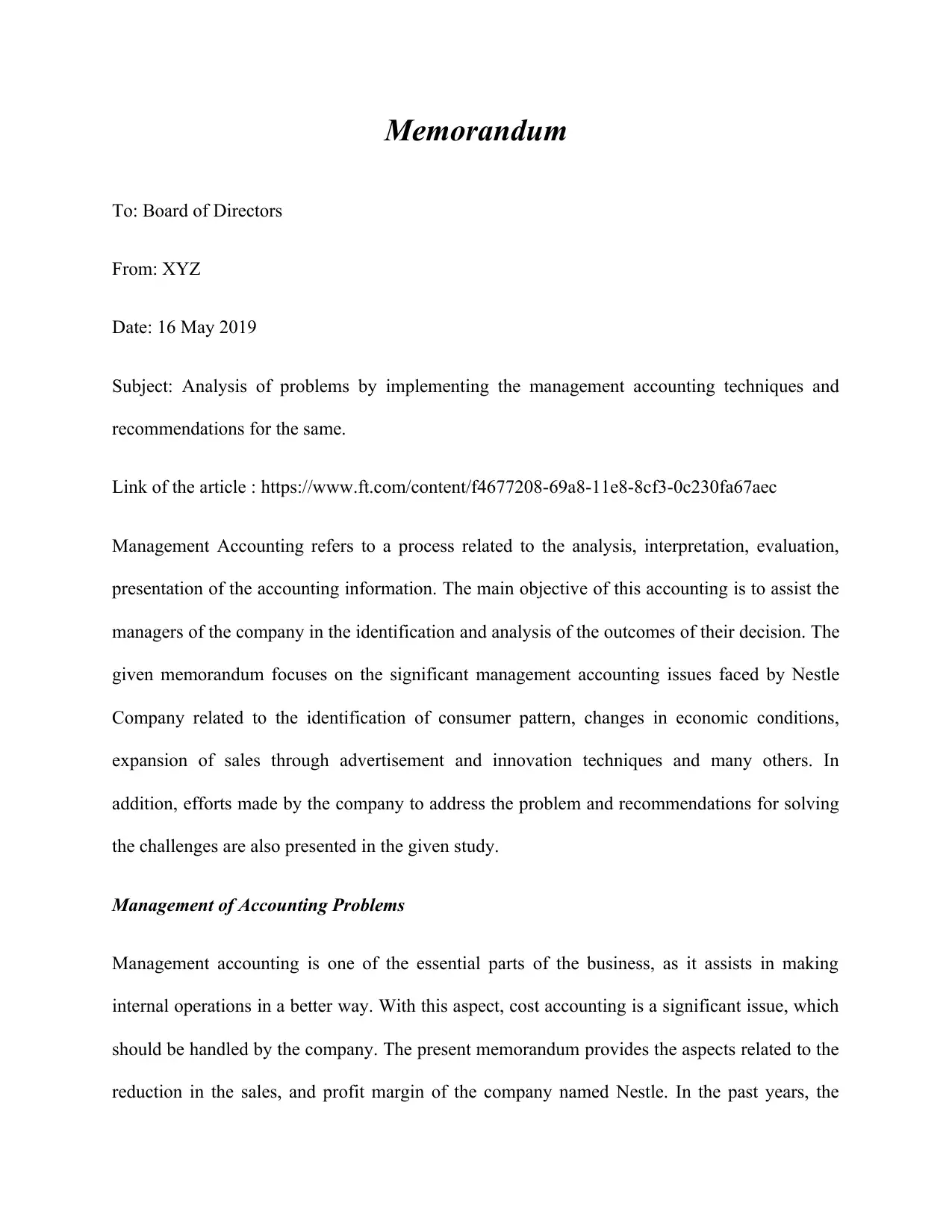
Memorandum
To: Board of Directors
From: XYZ
Date: 16 May 2019
Subject: Analysis of problems by implementing the management accounting techniques and
recommendations for the same.
Link of the article : https://www.ft.com/content/f4677208-69a8-11e8-8cf3-0c230fa67aec
Management Accounting refers to a process related to the analysis, interpretation, evaluation,
presentation of the accounting information. The main objective of this accounting is to assist the
managers of the company in the identification and analysis of the outcomes of their decision. The
given memorandum focuses on the significant management accounting issues faced by Nestle
Company related to the identification of consumer pattern, changes in economic conditions,
expansion of sales through advertisement and innovation techniques and many others. In
addition, efforts made by the company to address the problem and recommendations for solving
the challenges are also presented in the given study.
Management of Accounting Problems
Management accounting is one of the essential parts of the business, as it assists in making
internal operations in a better way. With this aspect, cost accounting is a significant issue, which
should be handled by the company. The present memorandum provides the aspects related to the
reduction in the sales, and profit margin of the company named Nestle. In the past years, the
To: Board of Directors
From: XYZ
Date: 16 May 2019
Subject: Analysis of problems by implementing the management accounting techniques and
recommendations for the same.
Link of the article : https://www.ft.com/content/f4677208-69a8-11e8-8cf3-0c230fa67aec
Management Accounting refers to a process related to the analysis, interpretation, evaluation,
presentation of the accounting information. The main objective of this accounting is to assist the
managers of the company in the identification and analysis of the outcomes of their decision. The
given memorandum focuses on the significant management accounting issues faced by Nestle
Company related to the identification of consumer pattern, changes in economic conditions,
expansion of sales through advertisement and innovation techniques and many others. In
addition, efforts made by the company to address the problem and recommendations for solving
the challenges are also presented in the given study.
Management of Accounting Problems
Management accounting is one of the essential parts of the business, as it assists in making
internal operations in a better way. With this aspect, cost accounting is a significant issue, which
should be handled by the company. The present memorandum provides the aspects related to the
reduction in the sales, and profit margin of the company named Nestle. In the past years, the
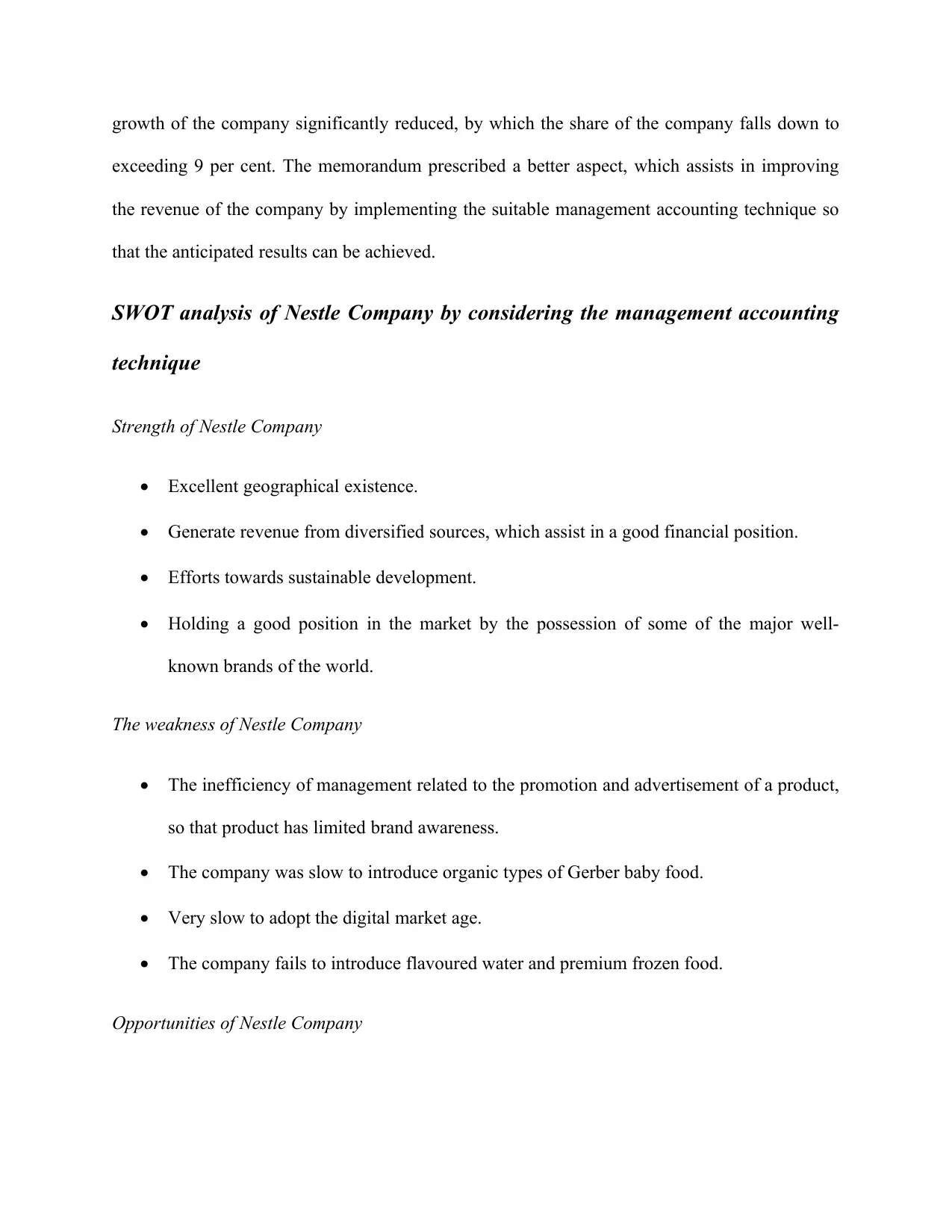
growth of the company significantly reduced, by which the share of the company falls down to
exceeding 9 per cent. The memorandum prescribed a better aspect, which assists in improving
the revenue of the company by implementing the suitable management accounting technique so
that the anticipated results can be achieved.
SWOT analysis of Nestle Company by considering the management accounting
technique
Strength of Nestle Company
Excellent geographical existence.
Generate revenue from diversified sources, which assist in a good financial position.
Efforts towards sustainable development.
Holding a good position in the market by the possession of some of the major well-
known brands of the world.
The weakness of Nestle Company
The inefficiency of management related to the promotion and advertisement of a product,
so that product has limited brand awareness.
The company was slow to introduce organic types of Gerber baby food.
Very slow to adopt the digital market age.
The company fails to introduce flavoured water and premium frozen food.
Opportunities of Nestle Company
exceeding 9 per cent. The memorandum prescribed a better aspect, which assists in improving
the revenue of the company by implementing the suitable management accounting technique so
that the anticipated results can be achieved.
SWOT analysis of Nestle Company by considering the management accounting
technique
Strength of Nestle Company
Excellent geographical existence.
Generate revenue from diversified sources, which assist in a good financial position.
Efforts towards sustainable development.
Holding a good position in the market by the possession of some of the major well-
known brands of the world.
The weakness of Nestle Company
The inefficiency of management related to the promotion and advertisement of a product,
so that product has limited brand awareness.
The company was slow to introduce organic types of Gerber baby food.
Very slow to adopt the digital market age.
The company fails to introduce flavoured water and premium frozen food.
Opportunities of Nestle Company
⊘ This is a preview!⊘
Do you want full access?
Subscribe today to unlock all pages.

Trusted by 1+ million students worldwide
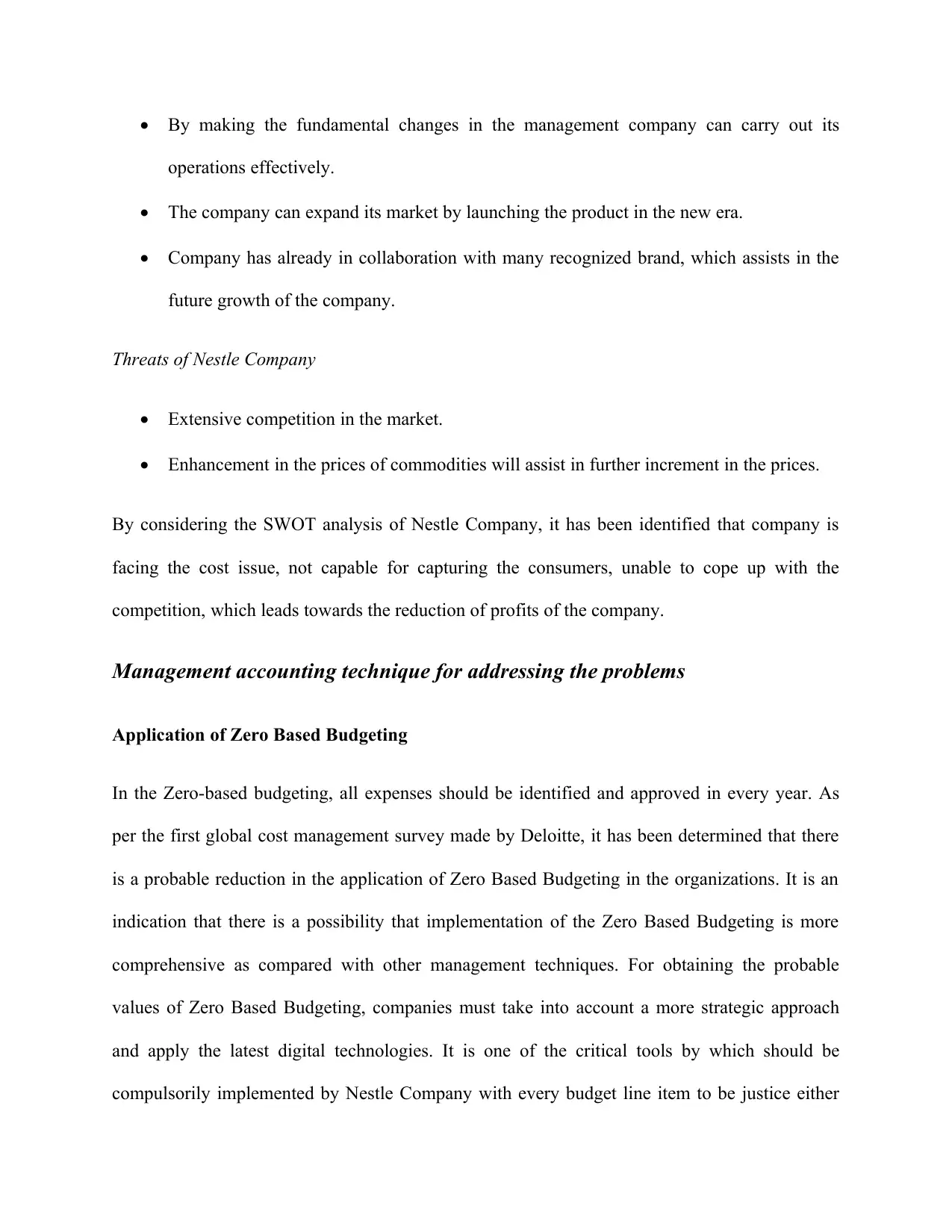
By making the fundamental changes in the management company can carry out its
operations effectively.
The company can expand its market by launching the product in the new era.
Company has already in collaboration with many recognized brand, which assists in the
future growth of the company.
Threats of Nestle Company
Extensive competition in the market.
Enhancement in the prices of commodities will assist in further increment in the prices.
By considering the SWOT analysis of Nestle Company, it has been identified that company is
facing the cost issue, not capable for capturing the consumers, unable to cope up with the
competition, which leads towards the reduction of profits of the company.
Management accounting technique for addressing the problems
Application of Zero Based Budgeting
In the Zero-based budgeting, all expenses should be identified and approved in every year. As
per the first global cost management survey made by Deloitte, it has been determined that there
is a probable reduction in the application of Zero Based Budgeting in the organizations. It is an
indication that there is a possibility that implementation of the Zero Based Budgeting is more
comprehensive as compared with other management techniques. For obtaining the probable
values of Zero Based Budgeting, companies must take into account a more strategic approach
and apply the latest digital technologies. It is one of the critical tools by which should be
compulsorily implemented by Nestle Company with every budget line item to be justice either
operations effectively.
The company can expand its market by launching the product in the new era.
Company has already in collaboration with many recognized brand, which assists in the
future growth of the company.
Threats of Nestle Company
Extensive competition in the market.
Enhancement in the prices of commodities will assist in further increment in the prices.
By considering the SWOT analysis of Nestle Company, it has been identified that company is
facing the cost issue, not capable for capturing the consumers, unable to cope up with the
competition, which leads towards the reduction of profits of the company.
Management accounting technique for addressing the problems
Application of Zero Based Budgeting
In the Zero-based budgeting, all expenses should be identified and approved in every year. As
per the first global cost management survey made by Deloitte, it has been determined that there
is a probable reduction in the application of Zero Based Budgeting in the organizations. It is an
indication that there is a possibility that implementation of the Zero Based Budgeting is more
comprehensive as compared with other management techniques. For obtaining the probable
values of Zero Based Budgeting, companies must take into account a more strategic approach
and apply the latest digital technologies. It is one of the critical tools by which should be
compulsorily implemented by Nestle Company with every budget line item to be justice either
Paraphrase This Document
Need a fresh take? Get an instant paraphrase of this document with our AI Paraphraser
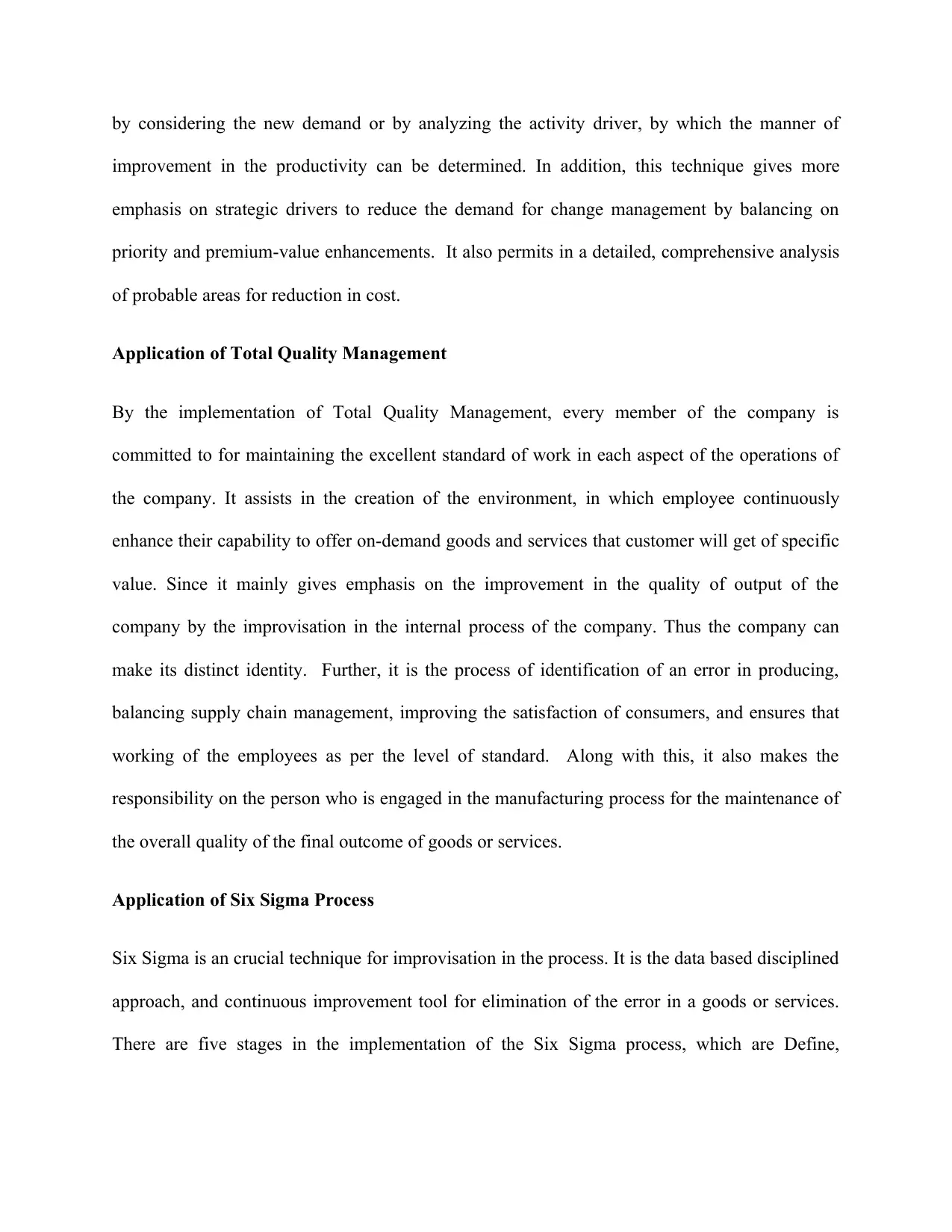
by considering the new demand or by analyzing the activity driver, by which the manner of
improvement in the productivity can be determined. In addition, this technique gives more
emphasis on strategic drivers to reduce the demand for change management by balancing on
priority and premium-value enhancements. It also permits in a detailed, comprehensive analysis
of probable areas for reduction in cost.
Application of Total Quality Management
By the implementation of Total Quality Management, every member of the company is
committed to for maintaining the excellent standard of work in each aspect of the operations of
the company. It assists in the creation of the environment, in which employee continuously
enhance their capability to offer on-demand goods and services that customer will get of specific
value. Since it mainly gives emphasis on the improvement in the quality of output of the
company by the improvisation in the internal process of the company. Thus the company can
make its distinct identity. Further, it is the process of identification of an error in producing,
balancing supply chain management, improving the satisfaction of consumers, and ensures that
working of the employees as per the level of standard. Along with this, it also makes the
responsibility on the person who is engaged in the manufacturing process for the maintenance of
the overall quality of the final outcome of goods or services.
Application of Six Sigma Process
Six Sigma is an crucial technique for improvisation in the process. It is the data based disciplined
approach, and continuous improvement tool for elimination of the error in a goods or services.
There are five stages in the implementation of the Six Sigma process, which are Define,
improvement in the productivity can be determined. In addition, this technique gives more
emphasis on strategic drivers to reduce the demand for change management by balancing on
priority and premium-value enhancements. It also permits in a detailed, comprehensive analysis
of probable areas for reduction in cost.
Application of Total Quality Management
By the implementation of Total Quality Management, every member of the company is
committed to for maintaining the excellent standard of work in each aspect of the operations of
the company. It assists in the creation of the environment, in which employee continuously
enhance their capability to offer on-demand goods and services that customer will get of specific
value. Since it mainly gives emphasis on the improvement in the quality of output of the
company by the improvisation in the internal process of the company. Thus the company can
make its distinct identity. Further, it is the process of identification of an error in producing,
balancing supply chain management, improving the satisfaction of consumers, and ensures that
working of the employees as per the level of standard. Along with this, it also makes the
responsibility on the person who is engaged in the manufacturing process for the maintenance of
the overall quality of the final outcome of goods or services.
Application of Six Sigma Process
Six Sigma is an crucial technique for improvisation in the process. It is the data based disciplined
approach, and continuous improvement tool for elimination of the error in a goods or services.
There are five stages in the implementation of the Six Sigma process, which are Define,
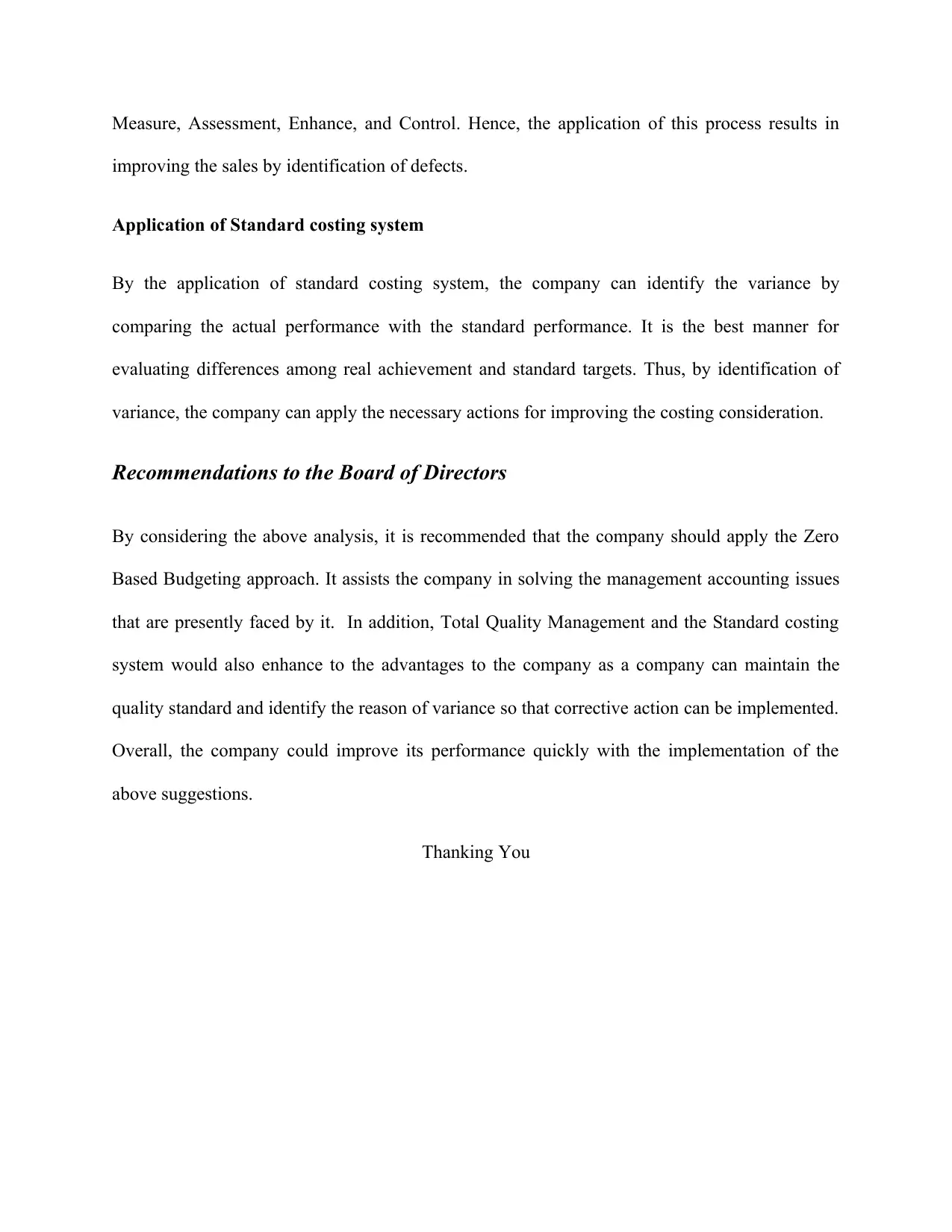
Measure, Assessment, Enhance, and Control. Hence, the application of this process results in
improving the sales by identification of defects.
Application of Standard costing system
By the application of standard costing system, the company can identify the variance by
comparing the actual performance with the standard performance. It is the best manner for
evaluating differences among real achievement and standard targets. Thus, by identification of
variance, the company can apply the necessary actions for improving the costing consideration.
Recommendations to the Board of Directors
By considering the above analysis, it is recommended that the company should apply the Zero
Based Budgeting approach. It assists the company in solving the management accounting issues
that are presently faced by it. In addition, Total Quality Management and the Standard costing
system would also enhance to the advantages to the company as a company can maintain the
quality standard and identify the reason of variance so that corrective action can be implemented.
Overall, the company could improve its performance quickly with the implementation of the
above suggestions.
Thanking You
improving the sales by identification of defects.
Application of Standard costing system
By the application of standard costing system, the company can identify the variance by
comparing the actual performance with the standard performance. It is the best manner for
evaluating differences among real achievement and standard targets. Thus, by identification of
variance, the company can apply the necessary actions for improving the costing consideration.
Recommendations to the Board of Directors
By considering the above analysis, it is recommended that the company should apply the Zero
Based Budgeting approach. It assists the company in solving the management accounting issues
that are presently faced by it. In addition, Total Quality Management and the Standard costing
system would also enhance to the advantages to the company as a company can maintain the
quality standard and identify the reason of variance so that corrective action can be implemented.
Overall, the company could improve its performance quickly with the implementation of the
above suggestions.
Thanking You
⊘ This is a preview!⊘
Do you want full access?
Subscribe today to unlock all pages.

Trusted by 1+ million students worldwide
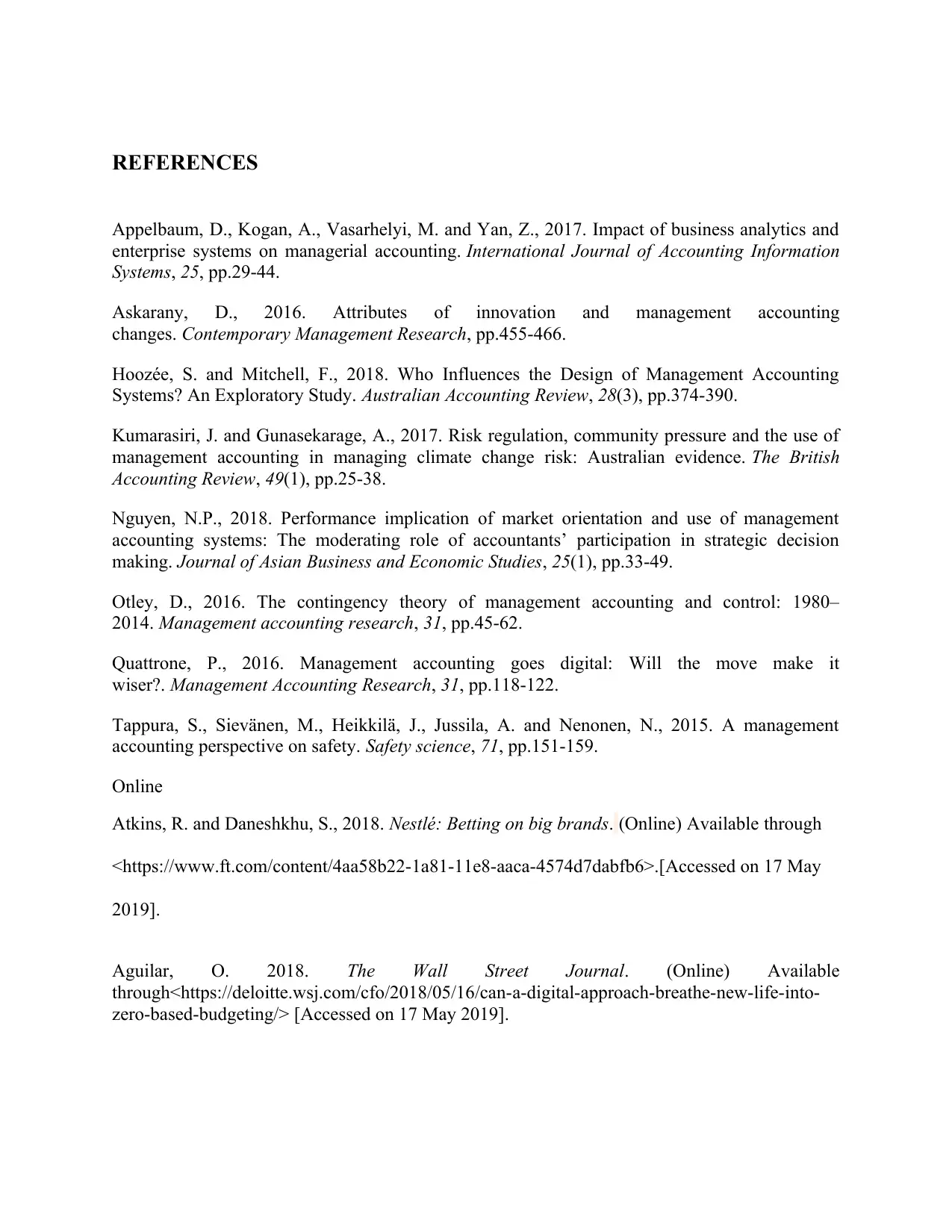
REFERENCES
Appelbaum, D., Kogan, A., Vasarhelyi, M. and Yan, Z., 2017. Impact of business analytics and
enterprise systems on managerial accounting. International Journal of Accounting Information
Systems, 25, pp.29-44.
Askarany, D., 2016. Attributes of innovation and management accounting
changes. Contemporary Management Research, pp.455-466.
Hoozée, S. and Mitchell, F., 2018. Who Influences the Design of Management Accounting
Systems? An Exploratory Study. Australian Accounting Review, 28(3), pp.374-390.
Kumarasiri, J. and Gunasekarage, A., 2017. Risk regulation, community pressure and the use of
management accounting in managing climate change risk: Australian evidence. The British
Accounting Review, 49(1), pp.25-38.
Nguyen, N.P., 2018. Performance implication of market orientation and use of management
accounting systems: The moderating role of accountants’ participation in strategic decision
making. Journal of Asian Business and Economic Studies, 25(1), pp.33-49.
Otley, D., 2016. The contingency theory of management accounting and control: 1980–
2014. Management accounting research, 31, pp.45-62.
Quattrone, P., 2016. Management accounting goes digital: Will the move make it
wiser?. Management Accounting Research, 31, pp.118-122.
Tappura, S., Sievänen, M., Heikkilä, J., Jussila, A. and Nenonen, N., 2015. A management
accounting perspective on safety. Safety science, 71, pp.151-159.
Online
Atkins, R. and Daneshkhu, S., 2018. Nestlé: Betting on big brands. (Online) Available through
<https://www.ft.com/content/4aa58b22-1a81-11e8-aaca-4574d7dabfb6>.[Accessed on 17 May
2019].
Aguilar, O. 2018. The Wall Street Journal. (Online) Available
through<https://deloitte.wsj.com/cfo/2018/05/16/can-a-digital-approach-breathe-new-life-into-
zero-based-budgeting/> [Accessed on 17 May 2019].
Appelbaum, D., Kogan, A., Vasarhelyi, M. and Yan, Z., 2017. Impact of business analytics and
enterprise systems on managerial accounting. International Journal of Accounting Information
Systems, 25, pp.29-44.
Askarany, D., 2016. Attributes of innovation and management accounting
changes. Contemporary Management Research, pp.455-466.
Hoozée, S. and Mitchell, F., 2018. Who Influences the Design of Management Accounting
Systems? An Exploratory Study. Australian Accounting Review, 28(3), pp.374-390.
Kumarasiri, J. and Gunasekarage, A., 2017. Risk regulation, community pressure and the use of
management accounting in managing climate change risk: Australian evidence. The British
Accounting Review, 49(1), pp.25-38.
Nguyen, N.P., 2018. Performance implication of market orientation and use of management
accounting systems: The moderating role of accountants’ participation in strategic decision
making. Journal of Asian Business and Economic Studies, 25(1), pp.33-49.
Otley, D., 2016. The contingency theory of management accounting and control: 1980–
2014. Management accounting research, 31, pp.45-62.
Quattrone, P., 2016. Management accounting goes digital: Will the move make it
wiser?. Management Accounting Research, 31, pp.118-122.
Tappura, S., Sievänen, M., Heikkilä, J., Jussila, A. and Nenonen, N., 2015. A management
accounting perspective on safety. Safety science, 71, pp.151-159.
Online
Atkins, R. and Daneshkhu, S., 2018. Nestlé: Betting on big brands. (Online) Available through
<https://www.ft.com/content/4aa58b22-1a81-11e8-aaca-4574d7dabfb6>.[Accessed on 17 May
2019].
Aguilar, O. 2018. The Wall Street Journal. (Online) Available
through<https://deloitte.wsj.com/cfo/2018/05/16/can-a-digital-approach-breathe-new-life-into-
zero-based-budgeting/> [Accessed on 17 May 2019].
1 out of 7
Related Documents
Your All-in-One AI-Powered Toolkit for Academic Success.
+13062052269
info@desklib.com
Available 24*7 on WhatsApp / Email
![[object Object]](/_next/static/media/star-bottom.7253800d.svg)
Unlock your academic potential
Copyright © 2020–2026 A2Z Services. All Rights Reserved. Developed and managed by ZUCOL.





